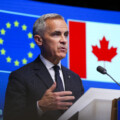Review of: The Crisis of Democratic Capitalism
Author: Martin Wolf
Publisher: Penguin Random House 2022
What changed the political and economic landscape that slowed the emergence of democratic, free-market countries? That’s the question Martin Wolf, chief economic commentator at the Financial Times, London, tries to answer in his new book, The Crisis of Democratic Capitalism.
After World War II, liberal democratic countries rose rapidly, even more so after the collapse of the Soviet Union. That trend is now in reverse. Of Europeans and Americans born in the1940, about 60 percent believed it was essential to live in a democracy. Of those born in the 1980s, only 45 percent of Europeans thought so, and only 30 percent of Americans did. It’s worse for American millennials; 24 percent thought democracy was a “bad” or “very bad” way to run a country. Wolf, who lost many of his relatives in the Holocaust, knows how quickly freedom is lost compared to those who never had to fight for it.
Wolf calls democratic capitalism the “operating system” of Western countries. Democracy and capitalism have different roles and objectives; free markets provide incentives to earn profits that create jobs and prosperity, while democracy offers political stability and income distribution for the needs of its citizens and national security. Neither can survive without the other. But when the balance between the two is dislodged, all bets are off. Wolf believes the West is now going through a period when that link has weakened, if not broken.
The marriage between democracy and free markets has failed to ensure fair wealth distribution, leaving lower and middle-income earners further behind. Many have lost faith in a system that enriches “well-connected insiders” who are shielded from their losses while taxpayers pick up the tab. The elites have too much power and too little accountability. Over the past two decades, we saw an increase in what Wolf called the rise of the “rentier economy,” where a few highly profitable firms take an ever-growing share of national income and profits.
The economy is no longer dominated by giant plants that once provided low- and medium-skilled workers with decent incomes and strong unions protection. Now fewer but highly profitable companies dominate the corporate landscape. In the 60s, General Motors was the largest company in North America, with over 500,000 skilled and semi-skilled workers. Apple Inc., with a market valuation of almost three trillion dollars, is one of the world’s most profitable companies, with only 120,000 highly skilled university graduates. Seven of the top 12 most valuable companies, including Microsoft, Nvidia, and Meta Platforms, are in this rentier class. And many of these workers belong to parties that push left-of-centre causes hostile to the politics of the old working class, further aggravating the political divide. Wolf draws a direct line from the collapse of democratic capitalism to the election of Donald Trump in 2016. But the deepening divide between rich and poor is nothing new. Much of it was seen decades ago with the widening gulf between the classes. And it looks like things may get worse before they improve.
One study estimates that “regenerative” AI systems—that can create content indistinguishable from humans—could destroy 300 million full-time jobs in Europe and the U.S. One can only imagine the political consequences when technology starts destroying the jobs of university graduates.
What’s to be done?

Martin Wolf ends his book with several recommendations to rebalance liberal democracy and capitalism and keep the state on a narrow corridor that doesn’t push the economy towards fascism or socialism. Wolf belongs firmly in the camp that channels Franklin Delano Roosevelt—particularly for the U.S.—with programs that raise the standard of living for all, good jobs for those who want to work, equal opportunity, and security for those who need it. He also calls for more civic patriotism and a media that supports rather than undermines democracy. Guaranteed annual income programs have some potential, but Wolf can’t seem to settle on any formula that doesn’t have serious flaws. On the other hand, he admits that real reform needs the elites. Without them, complex societies don’t work. But his biggest wish is to defeat the populist spirit. That may be more difficult. Donald Trump remains popular with no intention of leaving the political stage.
If there is one oversight in Wolf’s book, it’s the small role he gives to the raging culture wars in Western countries. He rightly believes the severe threats to democratic capitalism are essentially external, but the internal threats to democracy can’t be ignored. The young are disillusioned with democracy and are more focused on identity politics, slowing growth, and protecting the environment rather than making the economy more efficient. They believe democracy is a fraud and that the search for truth is outdated. That we should instead succumb to feelings and intuition, popular themes throughout Western academia.
The book’s strength is its courage and honesty in defending the pillars of our modern world without guilt or apology. It also reminds us of the fragility of political freedom and how easily populist leaders can exploit it. But it could have used a chapter or two to go beyond the economy and stress the damage caused by our bifurcated culture.
Recommended for You

Falice Chin: The ‘wild and weird’ Calgary Stampede

‘A celebration of the spirit of Alberta’: Ryan Hastman on the political, economic, and cultural importance of the Calgary Stampede

Michael Bonner: Are we witnessing the last gasp of Iran’s Islamic Republic?

‘He’s a master of globalization in a re-nationalizing world’: Michael Ignatieff on the domestic and geopolitical challenges facing Prime Minister Carney




